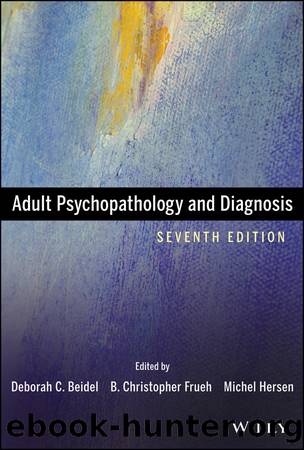Adult Psychopathology and Diagnosis by unknow

Author:unknow
Language: eng
Format: epub
ISBN: 9781118657089
Publisher: Wiley
Published: 2014-08-18T00:00:00+00:00
Dissociative Amnesia
The diagnosis of dissociative amnesia requires that the memory loss is extensive and not attributable to substance use or to a neurological or other medical condition such as age-related cognitive loss, complex partial seizures, or closed-head brain injury and that the symptoms are not better explained by DID, PTSD, acute stress disorder, somatic symptom disorder, or major or mild neurocognitive disorder (APA, 2013, p. 298). This disorder, formerly referred to as psychogenic amnesia, often presents as retrospective amnesia for some period or series of periods in a person's life, frequently involving a traumatic experience.
DSM-5 lists several subtypes of dissociative amnesia. In localized amnesia, the individual cannot recall any information from a specific period of time, such as total forgetting of a holiday week. Selective amnesia involves the loss of memories for some, but not all, events from a specific period of time. In generalized amnesia, individuals cannot recall anything about their entire lives, and in continuous amnesia, individuals forget each new event as it occurs. Finally, systematized amnesia consists of the “loss of memory for specific categories of information” (e.g., sexual abuse, a particular person). These last three types of dissociative amnesia—generalized, continuous, and systematized—are much less common than the others, and may be manifestations of more complex dissociative disorders, such as DID rather than dissociative amnesia alone.
Lynn et al. (2014) argued that the central diagnostic criterion for dissociative amnesia is vague and subjective in stipulating that one or more episodes of inability to recall important information must be “…inconsistent with ordinary forgetting” (Dahlenberg et al., p. 522). The reliability of judgments of what constitutes “ordinary forgetfulness” is questionable, and what is “ordinary” hinges on a variety of factors, including the situational context and presence of comorbid conditions. A similar point was raised by Read and Lindsay (2000), who demonstrated that when people are encouraged to remember more about a selected target event, they report their forgetting to be more extensive, compared with individuals who are asked to simply reminisce about a target event.
Download
This site does not store any files on its server. We only index and link to content provided by other sites. Please contact the content providers to delete copyright contents if any and email us, we'll remove relevant links or contents immediately.
Adulting by Kelly Williams Brown(3668)
Figure Drawing for Artists by Steve Huston(2795)
Draw Your Day by Samantha Dion Baker(2706)
Drawing Cutting Edge Anatomy by Christopher Hart(2676)
Drawing Shortcuts: Developing Quick Drawing Skills Using Today's Technology by Leggitt Jim(2532)
Make Comics Like the Pros by Greg Pak(2422)
Draw to Win: A Crash Course on How to Lead, Sell, and Innovate With Your Visual Mind by Dan Roam(2277)
How Proust Can Change Your Life by Alain De Botton(2259)
Day by Elie Wiesel(2239)
0041152001443424520 .pdf by Unknown(2218)
How The Mind Works by Steven Pinker(2211)
Rapid Viz: A New Method for the Rapid Visualization of Ideas by Kurt Hanks & Larry Belliston(2195)
Modern Cartooning by Christopher Hart(2185)
Poses for Artists Volume 2 - Standing Poses: An essential reference for figure drawing and the human form. (Inspiring Art and Artists) by Justin Martin(2141)
Draw-A-Saurus by James Silvani(2103)
Learn Drawing Quickly by Sharon Finmark(2089)
Tattoo Art by Doralba Picerno(2083)
Poses for Artists - Dynamic & Sitting: An essential reference for figure drawing and the human form (Inspiring Art and Artists Book 1) by Justin R Martin(2063)
Drawing and Painting Birds by Tim Wootton(2001)
